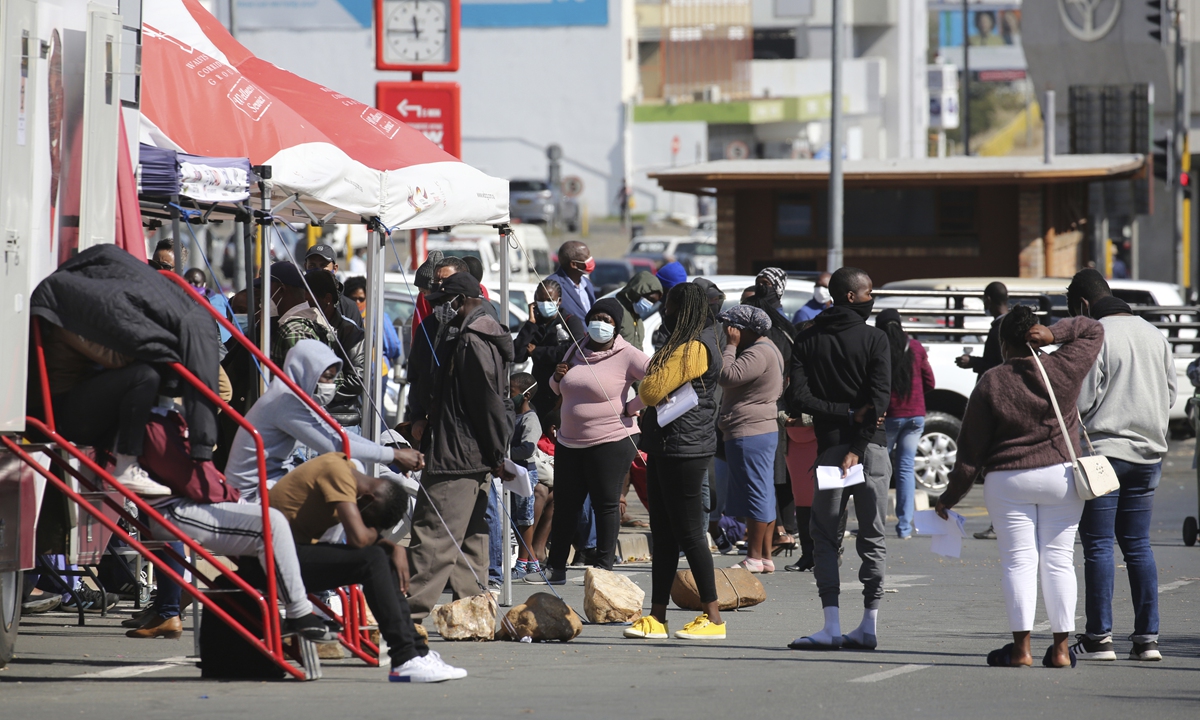
People queue to be tested for COVID-19 on June 15, 2021 in Windhoek, the capital of Namibia. Photo: VCG
The celebratory festive bustle in Namibia has boosted trade for local businesses and informal traders whose proceeds had dwindled due to the COVID-19 pandemic.
Shorti Hafeni, an informal trader who sells fresh produce in Oshakati in the northern part of Namibia, attributed the profit to relaxed COVID-19 measures, which allowed many locals to travel to the area for Christmas and New Year celebrations.
"Profit doubled over the festive season as I had more customers than any other period," Hafeni said on Monday.
Players in the tourism sector, hard hit by the COVID-19 pandemic, also witnessed a boom in trade.
Rauna Amutenya, an official from Desert Explorer, a tour and recreational company in coastal town Swakopmund, said that business, which declined in the last two years, picked up significantly during the festive season.
"Business was slow in the last two years, and we did not have business mainly due to restrictions on travel. But this year we had bookings by both locals and international tourists, which peaked in the festive season," she said.
Social and business activity also increased in rural areas.
Locals hosted massive traditional events such as family gatherings, which were not held in the previous year. At its most recent 38th COVID-19 public hearing, the government permitted the gathering of 200 people instead of a maximum of 50 people in the same period last year. The current public health measures run from December 16, 2021 to January 15, 2022.
Selma Mateus, who is about 95 years old, celebrated her birthday with a jubilant family reunion of her clan.
"I had not seen my extended family members in such a long time. It was good to receive everybody. We enjoyed music, modern and traditional cuisine," said Mateus from the Oshana region.
Celebrations such as those held by Mateus benefited many informal traders in rural areas selling traditional food items such as peas, dried spinach and marula oil as more people required these.
Kaapula Michael, who sells chickens and other products at the village, generated a substantial income of 6,000 Namibian dollars ($384.8) in two weeks.
"It would ordinarily take me a month to generate [the amount] or even two months," Michael said.
According to Namibia Statistics Agency, the country's domestic economy grew by 2.4 percent during the third quarter of 2021 compared to a decline of 12.3 percent recorded in the corresponding quarter of 2020.
版权声明:本文内容由互联网用户自发贡献,该文观点仅代表作者本人。本站仅提供信息存储空间服务,不拥有所有权,不承担相关法律责任。如发现本站有涉嫌抄袭侵权/违法违规的内容, 请发送邮件至 [email protected] 举报,一经查实,本站将立刻删除。

 微信扫一扫
微信扫一扫 